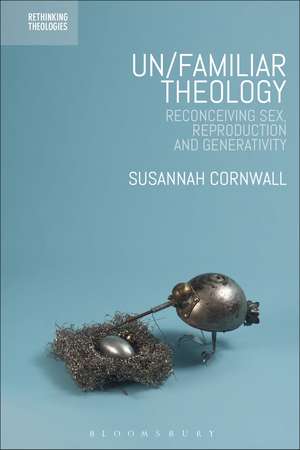Un/familiar Theology: Reconceiving Sex, Reproduction and Generativity: Rethinking Theologies: Constructing Alternatives in History and Doctrine
Autor Dr Susannah Cornwallen Limba Engleză Paperback – 26 dec 2018
Preț: 229.96 lei
Preț vechi: 296.65 lei
-22% Nou
Puncte Express: 345
Preț estimativ în valută:
44.01€ • 45.78$ • 36.33£
44.01€ • 45.78$ • 36.33£
Carte tipărită la comandă
Livrare economică 15-29 aprilie
Preluare comenzi: 021 569.72.76
Specificații
ISBN-13: 9780567685841
ISBN-10: 0567685845
Pagini: 224
Dimensiuni: 156 x 234 mm
Greutate: 0.3 kg
Editura: Bloomsbury Publishing
Colecția T&T Clark
Seria Rethinking Theologies: Constructing Alternatives in History and Doctrine
Locul publicării:London, United Kingdom
ISBN-10: 0567685845
Pagini: 224
Dimensiuni: 156 x 234 mm
Greutate: 0.3 kg
Editura: Bloomsbury Publishing
Colecția T&T Clark
Seria Rethinking Theologies: Constructing Alternatives in History and Doctrine
Locul publicării:London, United Kingdom
Caracteristici
Highlights the rapidly expanding phenomenon known as Quiverfull theology with its social and ecological implications
Notă biografică
Susannah Cornwall is Advanced Research Fellow in Theology and Religion at the University of Exeter, UK.
Cuprins
Acknowledgements1. Introducing Un/familiar Theology2. Generativity: The Disruption of Biological Origins3. The Content of Marriage: Two and Only Two?4. Natality: Reproduction and the Possibility of New Beginnings5: Adopting Our Own: Worldless Newcomers or Children of a Common God?6: Full Quivers and the Diversities of Generativity7: Un/familiar Institutions: Repetition and DifferenceConclusionWorks Cited
Recenzii
Cornwall's prolific writing is always fresh and innovative, weaving together classical and contemporary theology with contemporary thought and social practice. Her latest book does not disappoint. Her approach to marriage, same-sex families, adoption, even polyamory (and more) is a tour de force, achieving in her writing what she advocates for Christian traditions more generally - that they are dynamic; and that they must negotiate continuity with change, and identity with difference. Her analysis of 'generativity', whether in 'un/familiar' family forms, or within the theological tradition as it generates new thinking, is timely and convincing, and will also generate much appreciation among her readers.



